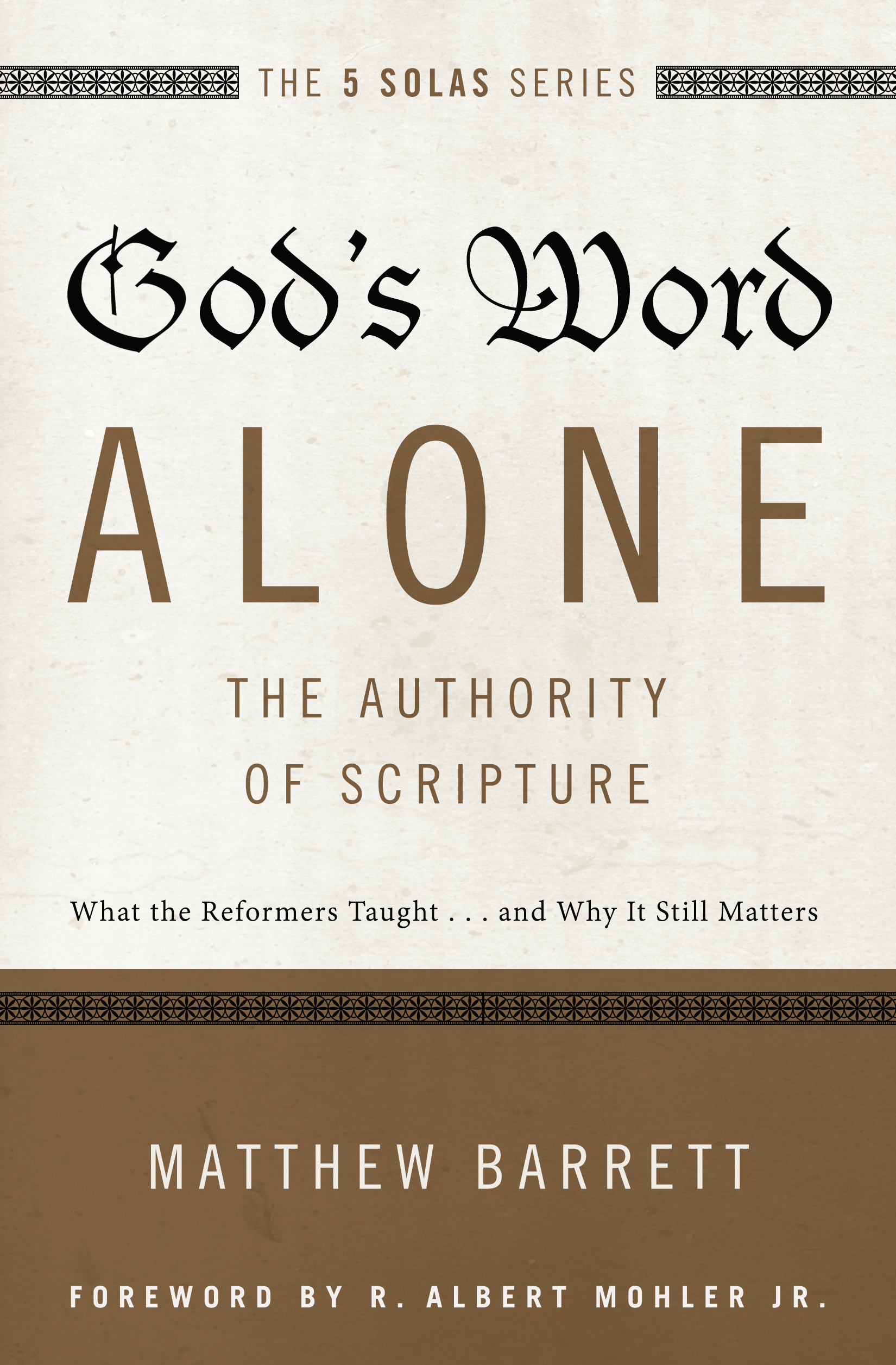Hi, I’m Fred Zaspel, and welcome back to Books At a Glance! We’re continuing to track out the Protestant Reformation in bite-size pieces, and today we begin talking about the “solas” of the Reformation – slogans that have become a kind of summary of the leading themes of the Reformers. First, we’ll take up sola Scriptura, talking to Dr. Matthew Barrett, author of God’s Word Alone.
Matthew, welcome!
Barrett:
Thank you for having me back; always glad to get to talk to you, and talk about this important topic.
Zaspel:
Just what is meant by sola Scriptura?
Barrett:
Yes, it’s best to begin with a definition isn’t it? Because often times sola Scriptura is misunderstood. I guess if I had to put it in one sentence, I would say that sola Scriptura means that only Scripture, because it’s God’s inspired Word, is our inerrant, sufficient, and final authority for the church. There’s many aspects to that definition, as you can tell. It affirms that Scripture is our only final authority; we may have many other valuable authorities in the church and in Christian tradition, but it’s our only final authority. And that’s because Scripture alone is God-breathed, fully truthful and sufficient in the Christian life.
Zaspel:
For those of you who may not be aware, sola Scriptura, of course, is Latin for Scripture alone and it’s a slogan that has come then to signify the supreme and single authority of Scripture.
What were the questions at issue in the Reformation that made this such an important point of emphasis?
Barrett:
Well, in the 16th century, specifically if we look at a figure like Martin Luther, the issue of justification, how is someone right with a holy God, seems to be very central to Martin Luther’s own conversion, his own conflict with Rome, and his own Reformation. But actually, beneath the surface and perhaps even more fundamental, then, the issue of justification is the issue of authority. And Luther came to realize that very quickly because as he came into tension with certain Roman theologians, and those in leadership, whether it was certain cardinals or the Pope himself, the question had to be asked, “who’s right?” and, more importantly, “who gets to determine who’s right?” And that is where the issue of authority came up. You see, prior to the 16th century, in the late medieval period, tradition had been elevated to a point in which it was equal to Scripture. Some even elevated tradition above Scripture, so that tradition was not only valuable and crucial, but also revelatory and an equal authority, or sometimes an even greater authority, than Scripture itself. When Luther came into conflict with Rome and some of its representatives, they would appeal to tradition as having the ultimate say in many of these matters and Luther responded in a way that they really didn’t like and said as much as he appreciated tradition and was in debt to so many church fathers, Luther said, nonetheless, only Scripture is inspired by God, God-breathed as Paul says to Timothy, and only Scripture is without error. Luther went on to say that councils and church theologians, they all err at some point or another. Scripture alone is our infallible and sufficient source of authority.
Zaspel:
To clarify, the Protestant Reformers did not disagree with the Roman Catholic Church with regard to the nature of Scripture itself but rather with its unique authority, right?
Barrett:
That’s absolutely right. Rome and the reformers both agreed that Scripture is inspired by God, it is without error. That wasn’t the contention; the real issue was – does Scripture alone have that place, that role…
Zaspel:
Exclusive authority.
Barrett:
Yes, that word exclusive is critical. Does it have that exclusive authority or does it share that type of authority with tradition, the magisterium, and so on, and the Pope himself.
Zaspel:
In what context today would you suggest we need this emphasis again?
Barrett:
Well, in many different ways. The debate with Rome continues, of course, and that’s something that Christians should be aware of. But also, I think, on a more practical level, I think evangelicals today face certain challenges within their own camp. Just to give you a very practical example, I think when we talk about a doctrine or a sola, like Scripture alone, the sufficiency of Scripture is very relevant. And of course sola Scriptura is more than just the topic of sufficiency, but sufficiency is certainly at the center of what sola Scriptura means. I think sufficiency reminds us that God’s word is to take center stage in the church. The evangelical church today, in many ways has absorbed we could say a consumeristic mentality. One that’s very prevalent in the culture. And so churches will approach worship as if they are selling a product and the attendee is the consumer, and since the product’s up for sale, the churches must show that their product is more entertaining than anything else that the world has to offer, and so churchy gimmicks tend to be the name of the game. And whatever keeps people coming back for more takes first priority and becomes the controlling principle for all things church related. That has many consequences. Preaching, then, has to be very relevant, and the music must entertain, and church events must keep people on the edge of their seats, and so on. But the sufficiency of Scripture, when applied to ministry, is much like pouring an ice cold bucket of water in our face. We can’t turn any longer to the culture to decide what the church should be and do. Instead, God and his Gospel and his Bride, which is us, are not products to be sold. And those who walk through the church doors on a Sunday morning are not consumers to entertain. That type of approach makes man the center and it treats the church more like a business. Something that is very foreign to the New Testament. In contrast, I would say that we must draw churchgoers and church leaders back to the Scriptures, which the Reformers did so well, and say that the Scripture is our final authority, our sufficient rule for worship. And in doing so, we must recover the ordinary means of grace – the preached Word, baptism, the Lord’s supper – these are the things that God uses to equip the saints and to transform us into the image of Christ. And I think at its most basic level, this means that the Word of God must take first place among the people of God. So on Sunday morning we should be focused, not around entertainment, but around the proclamation of the Word of God.
Zaspel:
We’re talking to Dr. Matthew Barrett, author of the excellent book, God’s Word Alone. You can check out more about it here on Books At a Glance. We’ve even interviewed him about it, (check it out here, also our summary here).
Matthew, good to talk to you always.
Barrett:
Thank you for having me.

